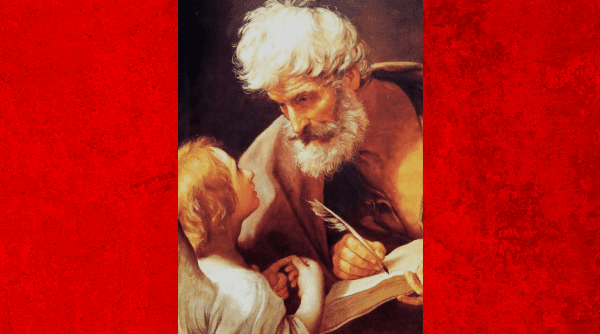On this Feast Day of St. Matthew, we must acknowledge a great mercy in Jesus’ call. As a tax collector, Matthew was considered a great sinner. In fact, the term “tax collector” was a biblical euphemism for great sinner. Yet despite this, Jesus called him to be an Apostle.
In our times, many set mercy and the fact that we are sinners in opposition to each other, but the Lord Jesus unites these realities together. For the Lord, mercy is necessary because there is sin, not because sin is “no big deal.” It is because sin is a big deal that mercy is needed and is glorious.
Bishop Robert Barron aptly states, Many receive the message of divine mercy as tantamount to a denial of the reality of sin, as though sin no longer matters. But just the contrary is the case. To speak of mercy is to be intensely aware of sin and its peculiar form of destructiveness (Vibrant Paradoxes: The Both/And of Catholicism, p. 1).
Mercy does not deny sin; it acknowledges it and supplies an often-challenging remedy. Jesus shows mercy by calling us from our sin and healing us from its effects.
This understanding is evident in the Gospel for the Feast of St. Matthew:
As Jesus passed by,
he saw a man named Matthew sitting at the customs post.
He said to him, “Follow me.”
And he got up and followed him.
While he was at table in his house,
many tax collectors and sinners came
and sat with Jesus and his disciples.
The Pharisees saw this and said to his disciples,
“Why does your teacher eat with tax collectors and sinners?”
He heard this and said,
“Those who are well do not need a physician, but the sick do.
Go and learn the meaning of the words,
I desire mercy, not sacrifice.
I did not come to call the righteous but sinners” (Matt. 9:9-13).
Notice three things from this Gospel about the relationship between mercy and sin:
I. In His mercy, Jesus reckons us as sinners and regards us as sick.Jesus states plainly, “I have come to call sinners” (this means us). He also says that those who are well do not need a doctor, but the sick (this means us) do.
Many people today have been deceived. Some even call their sin good and something of which to be proud. They say, “God made me this way,” or “God likes me just the way I am.” No! To those such as these the Lord Jesus says, “You are sick. You are a sinner.” An antiphon in the Breviary says, God sees all men as sinners, that he might show them his mercy.
So in His mercy Jesus does not overlook sin or call it something good; he calls it what it is: sin and sickness.
II. In His mercy, Jesus summons us to change. In this Gospel, Jesus calls Matthew away from his tax post, saying, “Follow me.” In other words, stop what you are doing; come away from it and follow me out of here. To the woman caught in adultery He says, “Do not sin again.” Jesus began His ministry by saying, “Repent and believe the Gospel.” To repent (metanoiete) means to change, to come to a new and different mind.
The changes Jesus insists upon are too numerous to list in their entirety, but among them are that we become free of lust, vengeful anger, greed, and unforgiveness and that we become more generous, loving, serene, faithful, and trusting.
Thus in His mercy, Jesus does not confirm us in our sin; He summons us away from it. He calls us to change and equips us to do so. His merciful call is this: “Come away from here. Enough of this; follow me.”
III. In His mercy, Jesus heals sinners of their sin. Jesus uses the image of a doctor and states plainly that sick people (sinners) need a doctor. Jesus is that doctor. A doctor does not look at a sick patient and say, “You’re fine the way you are” or “I affirm you.” That would be malpractice. Jesus sees sin for what it is. He calls it such and prescribes the necessary medicines. He will also likely speak to a person’s lifestyle and recommend needed changes. This is how a doctor heals.
Jesus invokes the image of a doctor with what He does. He diagnoses and says, “This is bad. This is sickness. This is sin.” He then applies healing remedies such as the sacraments, the Holy Liturgy, His Word, the carrying of the cross, active and passive purifications, punishments due to sin, solid moral teaching, and holy fellowship. Like a doctor, Jesus summons us from a bad and unhealthy life to a good and healthy one.
Thus, in His mercy, Jesus heals our sins. He does not ignore them or approve of them—and He certainly does not call them good or something to celebrate. In His mercy, He heals them. He ends them.
So mercy is not a bland kindness. It is not mere flattery that pretends that sin does not exist or that it doesn’t matter. Beware of fake, flattering mercy. True mercy says, “Sin is awful. Let’s get out of here and go to a far better place.”
Matthew got up and followed Jesus. How about us?
Image credit:
Guido Reni / Public domain
The post originally appeared in Community in Mission and is used with permission.




